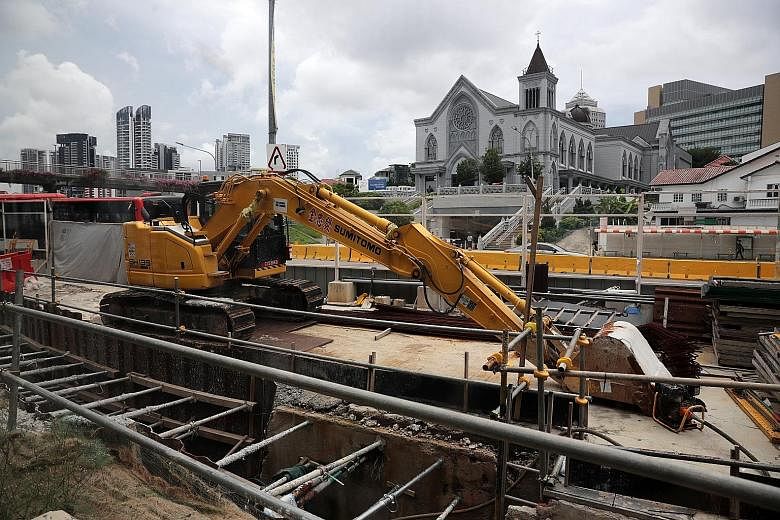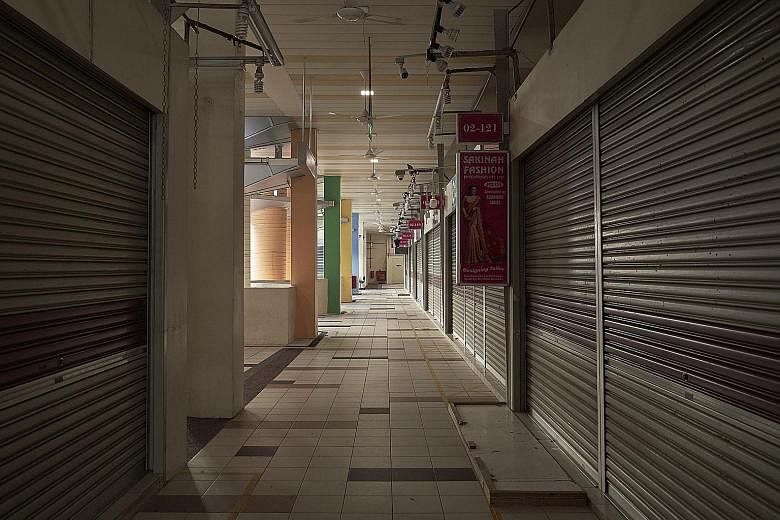It was an unusual term to describe an unusual law that has been enacted for very unusual times.
Law Minister K. Shanmugam likened the Covid-19 (Temporary Measures) Act to "Noah's Ark" because it was put together urgently by various ministries to prevent financial ruin caused by the pandemic.
A further amendment to the law earlier this month provides up to two more months of rental waiver for smaller firms.
Together with property tax rebates and cash grants, this means they will have up to four months of rent relief.
It is not the practice of the Government to intervene in business contracts and transactions that have been signed legally, but Mr Shanmugam gave vivid examples to Parliament in April as to why this must be done now.
WHY THE LAW IS NEEDED
The aim is to protect the vital interests of people by stopping the strict enforcement of certain contractual rights that could damage the whole economy.
"If we don't intervene, the consequences of this will be those in a position of advantage will make some money," he said.
"But most will suffer. Bankruptcies, insolvencies and complete destruction of the economic arena. (There will be) lots of grief, lots of good companies and businesses going under."
Similar laws have been used in the United States, where they were imposed during the global financial crisis in 2009 to protect home owners and renters facing foreclosure.
HELPING SMALL BUSINESSES STAY AFLOAT
If a tenant still cannot pay rent due to the Covid-19 pandemic, the lease cannot be terminated just because he is in arrears. And he also cannot be sued for the rent.
This is helping people hit hard by the crisis but it does not mean that all tenants do not have to pay rent. Those who can make payments must continue to do so.
In Germany, which passed a similar law, some profitable businesses sought to take advantage.
"Several people said they would not be paying rent, including a stream of retailers - Adidas and H&M, for example. Adidas was reported to have made a net profit of nearly €2 billion (S$3.2 billion) last year. It faced massive criticism," Mr Shanmugam said.
The new law is not "anti-landlord" - there is a deferral of payments but the rental obligations do not go away; rent will continue to accrue.
"When the whole house, meaning the whole economy, is under threat, we should try not to focus too much on our own individual rooms. We all need to pitch in, to save the economy as a whole," added Mr Shanmugam.
"And if it is truly the case that the landlord can find other tenants and the current tenant is taking advantage of the situation, let us know."
PREVENTING LAWSUITS IN THE CONSTRUCTION SECTOR
The total value of construction contracts awarded last year amounted to $33 billion.
The new Covid-19 law provides that a contractor cannot be held liable if it is unable to fulfil its tasks from Feb 1 until mid-October, unless it is extended by the minister.
AVOIDING EVENT-RELATED DISPUTES
People who have paid deposits for events that are cancelled because of Covid-19 will not have the payments forfeited.
BIRTHDAYS
For instance, a man made bookings in early March for his daughter's 21st birthday celebration with more than 10 guests on April 4. He approached the event space provider later in March to seek a refund or postponement in the light of the new social distancing rules, but he was told that postponements could be done only 30 days in advance.
"This is not reasonable," said Mr Shanmugam.
WEDDINGS
A couple had engaged an event planner for a wedding banquet for more than 500 guests that was supposed to take place this month.
The event planner told them the event could not be postponed, adding that its obligations would be fulfilled even if the wedding did not take place.
"The positions adopted by the event space provider, the event planner, were neither helpful nor reasonable," said Mr Shanmugam.
It meant that the father and the couple were entitled to ask for the event to be postponed and that their deposits, if any, cannot be forfeited.
BRIDAL STUDIOS
A group of bridal studios highlighted the challenges they have had with unreasonable customers who demanded full refunds, even after their studios had provided services to couples for up to a year before the wedding date, collecting staggered payments along the way.
They had also paid other suppliers. The studios said they would be glad to work out postponements for these couples with no penalties imposed.
NO NEED FOR IMMEDIATE REFUND
Deposits need not be refunded immediately.
There are different solutions: to postpone the event with the deposit retained, or cancel the event with the deposit repaid in full or partially, depending on expenses incurred and work done.
Ministry assessors can help the parties reach a fair resolution.
HELP FOR TRANSPORT-RELATED BUSINESS
Some excursion buses had been repossessed by financial companies, resulting in an immediate loss of work for those who need the vehicles for employment.
But the new law states that commercial vehicles cannot be repossessed during the crisis.
If a finance company can justify repossession, it can state its case to assessors, who will make a decision after hearing from both sides.
HELP TO STOP FORECLOSURE OF SMALL BUSINESSES
The total value of loans outstanding to small and medium-sized enterprises (SMEs) stands at about $76 billion.
If an SME is unable to repay instalments due to Covid-19, banks cannot seize the plant, machinery or fixed assets that have been pledged to secure the loans.
RELIEF FROM BANKRUPTCY
The Debt Repayment Scheme for individuals to avoid being made a bankrupt has been raised from $100,000 to $250,000. This allows more people to enrol in the scheme.
And before a person can be sued for bankruptcy, the amount owed must be a minimum of $60,000 instead of $15,000, while the statutory demand period has been extended from 21 days to six months before legal action can go ahead.
Likewise, debts companies owe for insolvency purposes have been increased, from $10,000 to $100,000. The statutory demand period has also gone up to six months.
But the law can only go so far. "It is also up to each individual Singaporean to have a sense of fairness. We hope that the spirit of SG United will underpin the many conversations to be had between contracting parties on how to move forward from this," Mr Shanmugam said.
Those who need more information or want to contact the Ministry of Law can do so at eservices.mlaw.gov.sg/enquiry.



